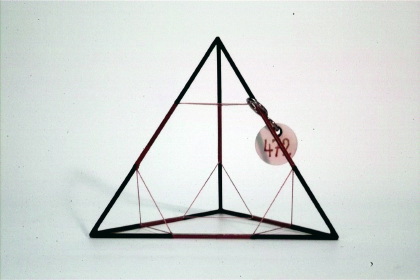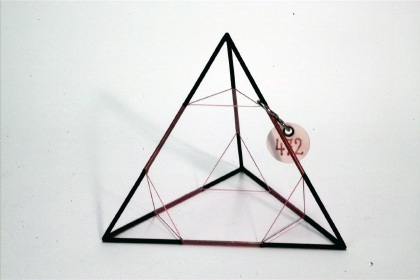Tetrahedron with inscribed truncated tetrahedron
Model 472
Description
Tetrahedron (wire) with inscribed (4+4)-plane polygon with 4·3 vertices (brown) that is polar to the triakis tetrahedron.
Additions
Tetrahedron: The tetrahedron is one of the five Platonic solids, see also model 702.
Inscribed (4+4)-plane polygon with 4 · 3 vertices: The solid inscribed in the tetrahedron is a truncated tetrahedron. The truncated tetrahedron arises from the tetrahedron by truncating its vertices. By truncating the vertices four new triangles are created and the previously existing triangles are transformed to four hexagons. The truncated tetrahedron is bounded by
4 triangles + 4 hexagons = 8 faces.
It has 4 · 3 = 12 vertices and 18 edges. At each vertice one triangle and two hexagons are meeting (3,6,6).
The truncated tetrahedron is one of 13 Archimedean solids, see also 482.
Triakis tetrahedron: The truncated tetrahedron is polar (dual) to the triakis tetrahedron. To create this new solid inscribe a sphere in the truncated tetrahedron such that the sphere touches each of the faces in exactly one point. These points of contact create the vertices of the dual solid. By connecting these eight vertices 12 triangles are formed. These triangles are the faces of the triakis tetrahedron. The dual solid has the same number of edges, while the number of vertices and faces is exchanged.
There are 11 Archimedean solids in the collection.
| 472 | Truncated tetrahedron | inscribed in a tetrahedron |
| 473 | Truncated octahedron | inscribed in an octahedron |
| 474 485 |
Cuboctahedron | 474 inscribed in an octahedron 485 inscribed in a cube |
| 475 | Truncated cube | inscribed in an octahedron |
| 476 | Rhombicuboctahedron | inscribed in a cube |
| 478 | Truncated icosahedron | inscribed in an icosahedron |
| 479 | truncated dodecahedron | inscribed in a dodecahedron |
| 480 481 |
Icosidodecahedron | 480 inscribed in a dodecahedron 481 inscribed in an icosahedron |
| 482 | Rhombicosidodecahedron | |
| 483 | Snub dodecahedron | |
| 484 | Truncated cube | inscribed in a cube |
The truncated icosidodecahedron and the lost truncated cuboctahedron are not included in the collection.
Showcase of this model is Case number 20
References
Heesch, H.. Comm.Math.Helv, 6, p. 147, n=3, Case 1c.
Hess, E.(1883). Kugelteilung, Teubner, mit Figuren, p. 55.



